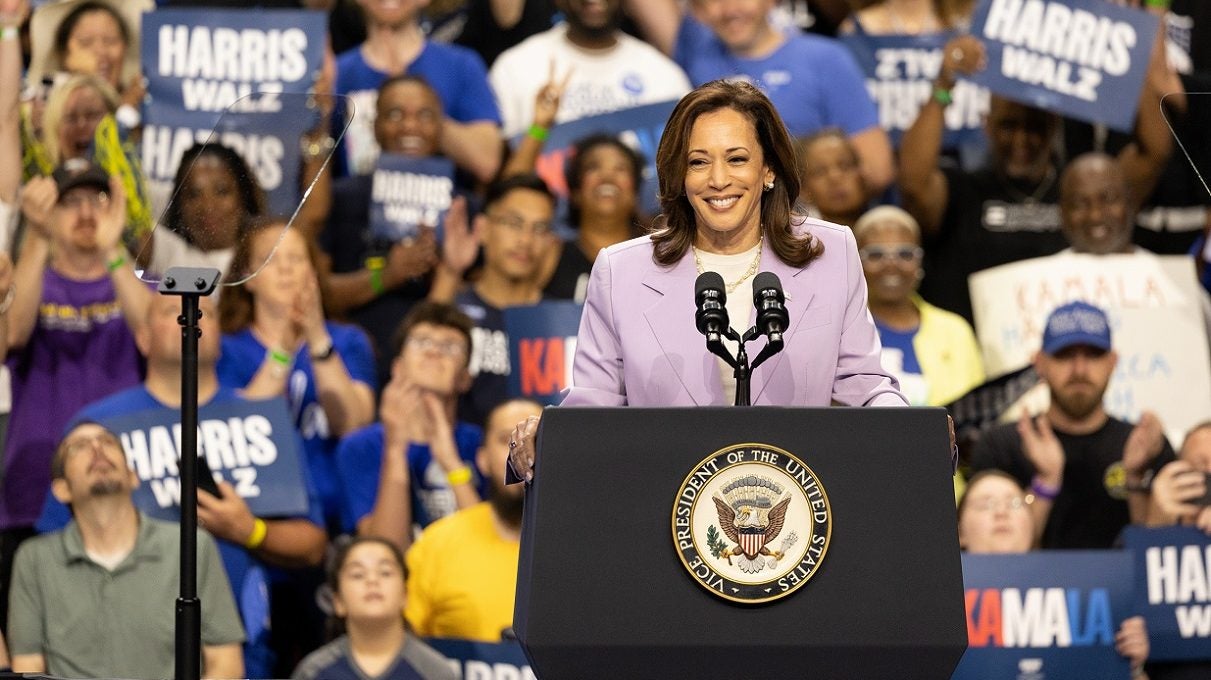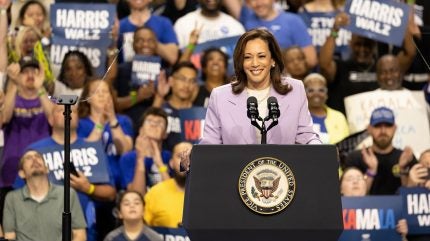

Kamala Harris has pledged to ban what the presidential candidate called “price gouging” in food.
Speaking in North Carolina on Friday (16 August), Harris proposed introducing a law to prohibit the practice, characterised as purportedly artificially raising prices to levels deemed unfair or unwarranted.
The Democrat nominee said: “Believe me, as president, I will go after the bad actors and I will work to pass the first-ever federal ban on price gouging on food.
“My plan will include new penalties for opportunistic companies that exploit crises and break the rules, and we will support smaller food businesses that are trying to play by the rules and get ahead.”
Harris was addressing a crowd just two days after the latest inflation numbers were issued by the US Bureau of Labor Statistics showing prices of food and soft drinks have come down to a single-digit rate from as high as 11.4% in August 2022.
The consumer price index for food and non-alcoholic beverages was unchanged in July at 2.2% year on year, as were the components for food at home and eating out at 1.1% and 4.1%, respectively.
Access the most comprehensive Company Profiles
on the market, powered by GlobalData. Save hours of research. Gain competitive edge.

Company Profile – free
sample
Your download email will arrive shortly
We are confident about the
unique
quality of our Company Profiles. However, we want you to make the most
beneficial
decision for your business, so we offer a free sample that you can download by
submitting the below form
By GlobalData
Prices of meat, poultry, fish and eggs rose above that rate, increasing 3%. However, the cost of dairy items and fruit and vegetables both dropped 0.2%.
Headline inflation covering a basket of all items measured in the economy was relatively flat last month at 2.9%, compared to 3% in June.
“As president, I will take on the high costs that matter most to most Americans, like the cost of food,” Harris pledged.
“We will help the food industry become more competitive because I believe competition is the lifeblood of our economy. More competition means lower prices for you and your families.”
The BBC quoted Robert Weissman, the co-president of the consumer watchdog Public Citizen, as saying Harris’s plans form a “pro-consumer, anti-corporate abuse agenda” and are more “aggressive” than any proposed or taken by the current Biden administration ahead of the November presidential elections.
A comment was also carried by the broadcaster from Michael Salinger, a professor of markets, public policy and law at Boston University’s Questrom School of Business.
He said a price-gouging proposal such as a ban on the practice was also put forward during the tenure of George W Bush.
“I thought then that it was a bad idea and I think now that it’s a bad idea,” Salinger told the BBC. “To impose controls on competitive markets will lead to shortages – that’s always been our experience.”
Such price-gouging criticism lodged at food manufacturers and grocers has largely been deemed as unfair as producers faced the rising costs of energy, raw materials and labour.
Forced to raise prices against such headwinds, food manufacturers’ lost volumes although top-line revenues were given a boost from higher prices. However, as inflation continues its easing cycle producers are looking for ways to support a volume recovery, while still pricing to some extent for the inflation remaining in the economy.
Harris said: “We all know that prices went up during the pandemic when the supply chains shut down and failed, but our supply chains have now improved and prices are still too high.
“A loaf of bread costs 50% more today than it did before the pandemic. Ground beef is up almost 50%. Many of the big food companies are seeing their highest profits in two decades. And while many grocery chains pass along these savings, others still aren’t.”
Earlier this month, the US Federal Trade Commission set out plans to launch a new investigation into why grocery prices remain inflated when food inflation has eased from its peak.
Reflecting on Harris’s speech, Neil Saunders, managing director for the retail practice at GlobalData, Just Food‘s parent, said: “Blaming the food industry for price increases might make for good politics, but it’s a lousy policy that is more about shifting the blame for inflation onto private companies than it is about helping ordinary consumers.
“Around 37 states and territories already have price gouging laws on the books and no major grocers have been charged or prosecuted under these. There’s a reason for that: price gouging isn’t happening.”
He added: “If you look at the operating margins of the major grocers, they are still well below 4% and are not out of line with the past ten years. There just hasn’t been profiteering in the way some politicians are making out there has been. Indeed, grocery remains an extremely low-margin sector compared to other industries.”

